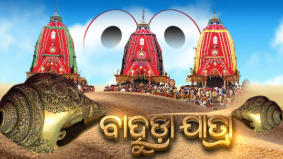

Bhubaneswar: "The journey of the divine is never just about the destination—it's about the sacred pauses that reveal the heart of devotion," reflects Pandit Raghunath Mohapatra, a hereditary priest at the Jagannath Temple in Puri, as he describes the profound spiritual significance of Bahuda Jatra, Lord Jagannath's homecoming festival.
While the world celebrates the grandeur of Rath Yatra, when Lord Jagannath, Balabhadra, and Subhadra embark on their annual sojourn to Gundicha Temple, few understand the deeper mystique surrounding their return journey—Bahuda Jatra. This sacred homecoming, occurring on the ninth day after Rath Yatra, carries within it a unique tradition that sets it apart from any other religious festival in Hindu culture.
The most distinctive feature of Bahuda Jatra lies in what devotees call the "Divine Pause"—a spontaneous stop that the chariots make at the Mausi Maa (Aunt's) temple, dedicated to Goddess Ardhashini. This unscheduled halt transforms the return journey into something far more significant than a mere procession.
"It's as if the Lord himself decides to visit his aunt before returning home, just as any beloved nephew would do," explains Dr. Suryanarayan Rajguru, a scholar of Jagannath traditions. "This isn't planned by humans—the chariots seem to pause of their own accord near the Mausi Maa temple, and the deities are offered poda pitha (a traditional Odia cake) and other delicacies."
The ritual that unfolds during this pause is extraordinary. Unlike the formal protocols of temple worship, the interaction between the deities and Mausi Maa carries an intimate, familial warmth. The priests perform a special offering ceremony where poda pitha, coconut, and other traditional foods are presented to the deities, symbolizing the aunt's affection for her divine nephews and niece.
What makes this tradition even more remarkable is its unpredictability. "No two Bahuda Jatras are identical," notes Jagannath Das, a lifelong devotee who has witnessed over forty return journeys. "Sometimes the chariots stop for minutes, sometimes for hours. The divine decides the duration, and we simply follow their lead."
The spiritual significance extends beyond the familial metaphor. According to ancient texts, this pause represents the soul's reluctance to leave the material world and return to the divine realm. The Mausi Maa temple visit symbolizes the final earthly attachment before the ultimate surrender to the divine will.
The preparation for this unique ritual begins days in advance. The temple administration arranges for special offerings, but the quantities are never predetermined. "We prepare what we can, but the divine appetite is beyond human calculation," laughs Shrimati Kamala Devi, whose family has been preparing offerings for the Mausi Maa temple for five generations.
The emotional climax of Bahuda Jatra occurs when the chariots finally approach the main temple. Unlike the jubilant departure during Rath Yatra, the return carries a bittersweet quality. Devotees believe that the deities are reluctant to end their earthly sojourn, making the homecoming both joyous and melancholic.
This year, as millions prepare to witness Bahuda Jatra, the ancient tradition continues to mystify and inspire. The festival serves as a reminder that divine love transcends formal worship, finding expression in the simple, human gestures of visiting loved ones and sharing meals together.